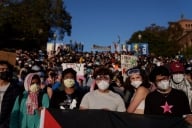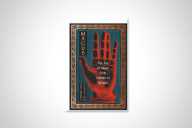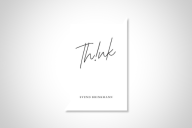You have /5 articles left.
Sign up for a free account or log in.
A warning: This week’s column will be miscellaneous, not to say meandering. It updates earlier stories on Wikipedia, Upton Sinclair, and the Henry Louis Gates method of barbershop peer-review. It also provides a tip on where to score some bootleg Derrida.
Next week, I’ll recap some of my talk from the session on “Publicity in the Digital Age” at the annual conference of the Association of American University Presses, covered here last week. The audience consisted of publicists and other university-press staff members. But some of the points covered might be of interest to readers and writers of academic books, as well as those who publish them.
For now, though, time to link up some loose ends....
One blogger noted that the comments following my column on Wikipedia were rather less vituperative than usual. Agreed -- and an encouraging sign, I think. The problems with open-source encyclopedism are real enough. Yet so are the opportunities it creates for collaborative and public-spirited activity. It could be a matter of time before debate over Wikipedia turns into the usual indulgence in primal-scream therapy we call "the culture wars." But for now, anyway, there’s a bit of communicative rationality taking place. (The Wikipedia entry on "communicative rationality" is pretty impressive, by the way.)
A few days after that column appeared, The New York Times ran a front-page article on Wikipedia. The reporter quoted one Wikipedian’s comment that, at first, “everything is edited mercilessly by idiots who do stupid and weird things to it.” Over time, though, each entry improves. The laissez faire attitude towards editing is slowly giving way to quality control. The Times noted that administrators are taking steps to reduce the amount of “drive-by nonsense.”
The summer issue of the Journal of American History includes a thorough and judicious paper on Wikipedia by Roy Rosenzweig, a professor of history and new media at George Mason University. Should professional historians join amateurs in contributing to Wikipedia? “My own tentative answer,” he writes, “is yes.”
Rosenzweig qualifies that judgment with all the necessary caveats. But overall, he finds that the benefits outweigh the irritations. “If Wikipedia is becoming the family encyclopedia for the twenty-first century,” he says, “historians probably have a professional obligation to make it as good as possible. And if every member of the Organization of American Historians devoted just one day to improving the entries in her or his areas of expertise, it would not only significantly raise the quality of Wikipedia, it would also enhance popular historical literacy.”
The article should be interesting and useful to scholars in other fields. It is now available online here.
This year marks the centennial of Upton Sinclair’s classic muckraking novel, The Jungle, or rather, of its appearance in book form, since it first ran as a serial in 1905. In April of last year, I interviewed Christopher Phelps, the editor of a new edition of the novel, for this column.
Most of Sinclair’s other writings have fallen by the wayside. Yet he is making a sort of comeback. Paul Thomas Anderson, the director of Boogie Nights and Magnolia, is adapting Sinclair’s novel Oil! -- for the screen; it should appear next year under the title There Will Be Blood. (Like The Jungle, the later novel from 1927 was a tale of corruption and radicalism, this time set in the petroleum industry.) And Al Gore has lately put one of Sinclair's pithier remarks into wide circulation in his new film: “It is difficult to get a man to understand something when his salary depends upon his not understanding it.”
That sentiment seems appropriate as a comment on a recent miniature controversy over The Jungle. As mentioned here one year ago, a small publisher called See Sharp Press claims that the standard edition of Sinclair’s text is actually a censored version and a travesty of the author’s radical intentions. See Sharp offers what it calls an “unexpurgated” edition of the book -- the version that “Sinclair very badly wanted to be the standard edition,” as the catalog text puts it.
An article by Phelps appearing this week on the History News Network Web site takes a careful look at the available evidence regarding the book’s publishing history and Sinclair’s own decisions regarding the book and debunks the See Sharp claims beyond a reasonable doubt.
In short, Sinclair had many opportunities to reprint the serialized version of his text, which he trimmed in preparing it for book form. He never did so. He fully endorsed the version now in common use, and made no effort to reprint the "unexpurgated" text as it first appeared in the pages of a newspaper.
It is not difficult to see why. Perhaps the most telling statement on this matter comes from Anthony Arthur, a professor of English at California State University at Northridge, whose biography Radical Innocent: Upton Sinclair has just been published by Random House. While Arthur cites the “unexpurgated” edition in his notes, he doesn’t comment on the claims for its definitive status. But he does characterize the serialized version of the novel as “essentially a rough draft of the version that readers know today, 30,000 words longer and showing the haste with which it was written.”
A representative of See Sharp has accused me of lying about the merits of the so-called unexpurgaged edition. Indeed, it appears that I am part of the conspiracy against it. (This is very exciting to learn.) And yet -- restraining my instinct for villainy, just for a second -- let me also point you to a statement at the See Sharp website explaining why the version of The Jungle that Sinclair himself published is a cruel violation of his own intentions.
Memo to the academy: Why isn’t there a variorum edition of The Jungle? There was a time when it would have been a very labor-intensive project -- one somebody might have gotten tenure for doing. Nowadays it would take a fraction of the effort. The career benefits might be commensurate, alas. But it seems like a worthy enterprise. What’s the hold-up?
In February 2005, I attended a conference on Jacques Derrida held at the Cardozo Law School in New York, covering it in two columns: here and here. A good bit of new material by “Jackie” (as his posse called him) has appeared in English since then, with more on the way this fall. Next month, Continuum is publishing both a biography of Derrida and a volume described as “a personal and philosophical meditation written within two month’s of Derrida’s death.”
Bet you didn’t know there was going to be a race, did you?
In the meantime, I’ve heard about a new translation, available online, of one of Derrida’s late-period writings. It is part of his engagement with the figure of Abraham, the founding phallogocentric patriarch of the three great monotheistic religions. The translator, Adam Kotsko, is a graduate student at the Chicago Theological Seminary. (See this item on the translation from his blog.)
The potential for “open source” translation may yet open more cans of worms than any team of intellectual-property lawyers can handle. I’ll throw this out as a request to anyone who has thoughts on the matter: If you’ve committed them to paper (or disk) please drop me a line at the address given below.
And finally, a return to the intriguing case of Emma Dunham Kelley-Hawkins -- the most important African-American writer who was not actually an African-American writer.
In a column last spring, I reported on the effort to figure out how the author of some rather dull, pious novels had become a sort of cottage industry for critical scholarship in the 1990s. After a couple of days of digging, I felt pretty confident in saying that nobody had thought to categorize Kelley-Hawkins as anything but a white, middle-class New England novelist before 1955.
That was the year a bibliographer included her in a listing of novels by African-American writers -- though without explaining why. And for a long time after that, the scholarship on Kelley-Hawkins was not exactly abundant. Indeed, it seemed that the most interesting thing you could say about her fiction was that all of the characters appeared to be white. Kelley-Hawkins did make a very few references to race, but they were perfectly typical of white prejudice at its most casually cruel.
Only after Henry Louis Gates included her work in a series of reprints by African-American women writers did critics begin noticing all the subtle -- the very, very subtle -- signs of irony and resistance and whatnot. Why, the very absence of racial difference marked the presence of cultural subversion! Or something.
So much ingenuity, in such a bad cause.... Subsequent research suggests that Kelley-Hawkins was Caucasian, by even the most stringent “one drop” standards of white racial paranoia in her day.
A recent item by Caleb McDaniel discusses the most recent work on Kelley-Hawkins. The puzzle now is how the initial re-categorization of her ever took place. Evidently that bibliography from 1955 remains the earliest indication that she might have been African-American. (A second puzzle would be how anyone ever managed to finished reading one of her novels, let alone embroidering it with nuance. They can be recommended to insomniacs.)
McDaniel also quotes something I’d forgotten: the statement by Henry Louis Gates that, if he had put up a photograph of Kelly-Hawkins in his barbershop, “I guarantee the vote would be to make her a sister."
You tend to expect a famous scholar to be familiar with the concept of the sepia tone. Evidently not. Here, again, is where Wikipedia might come in handy.








